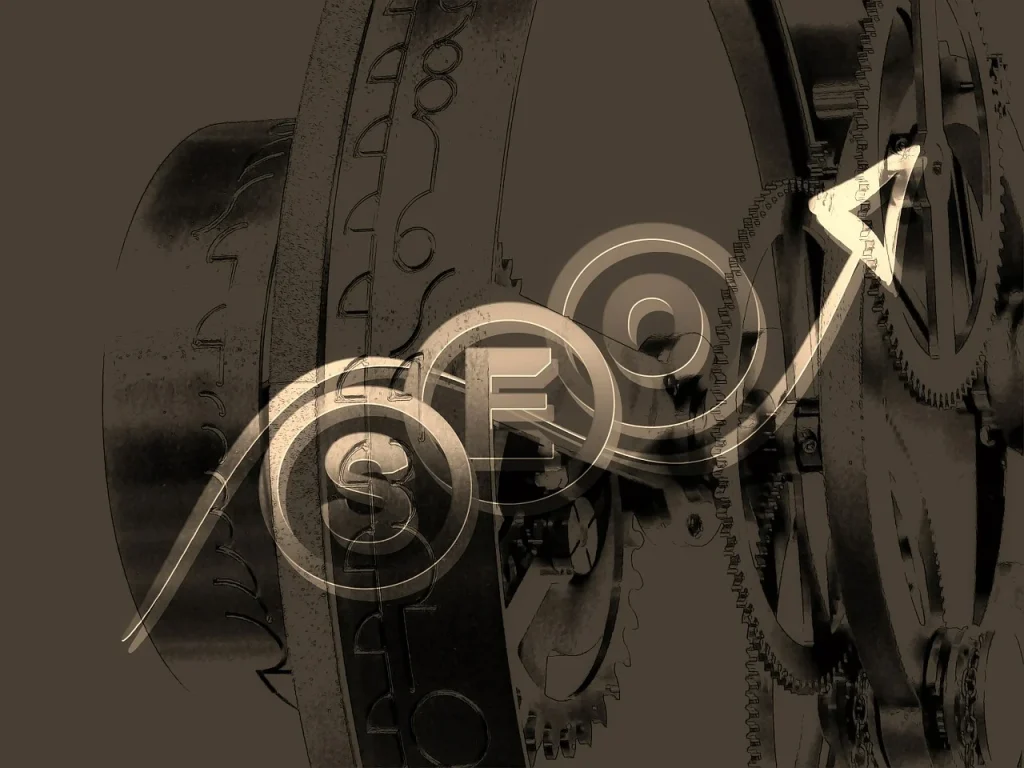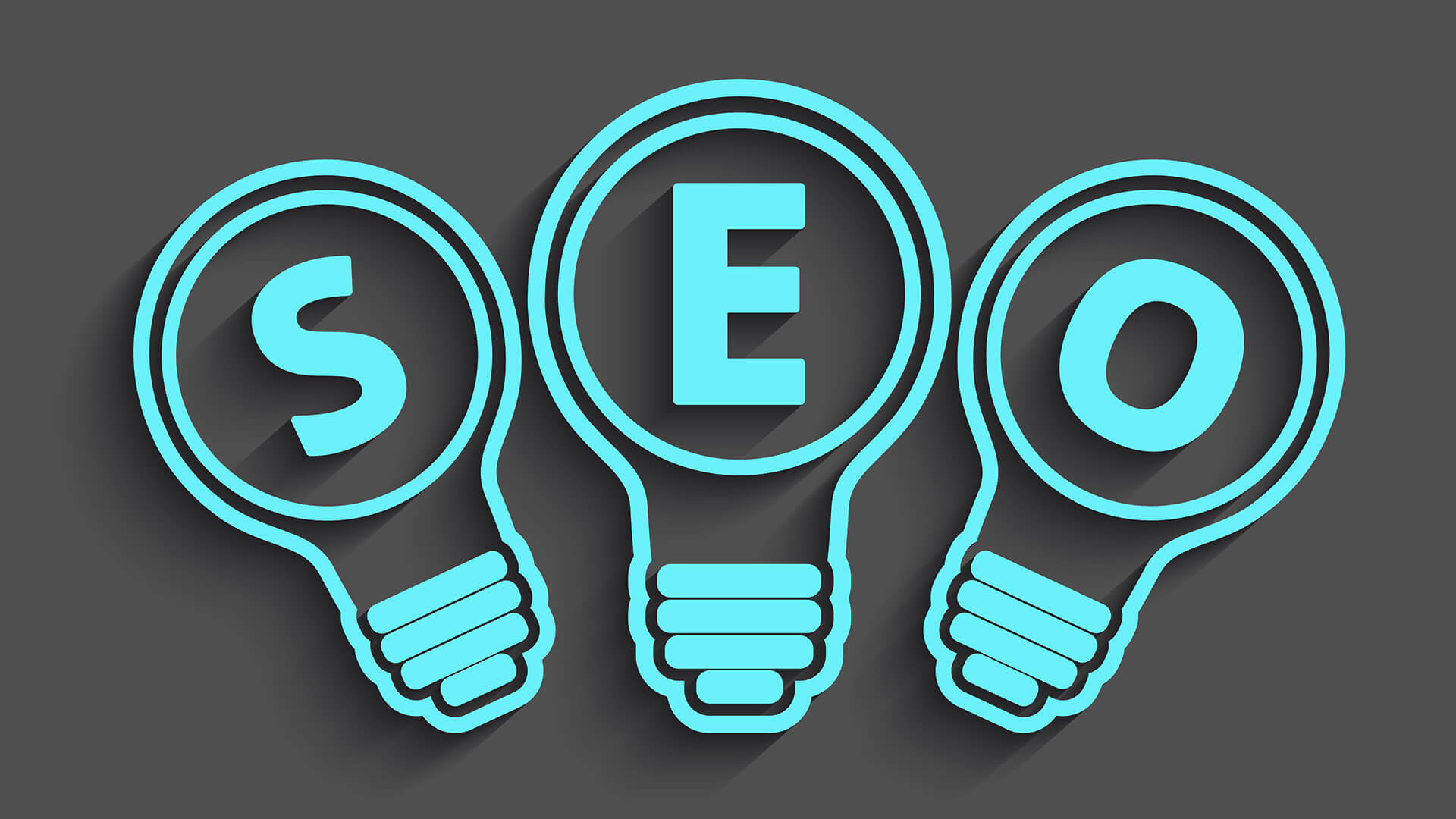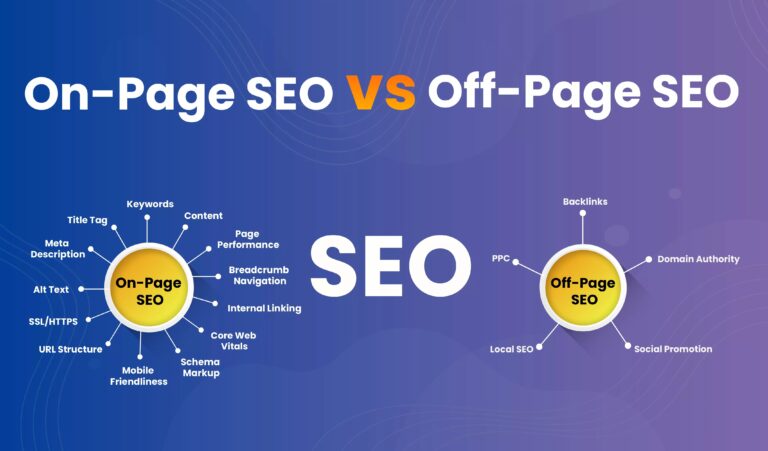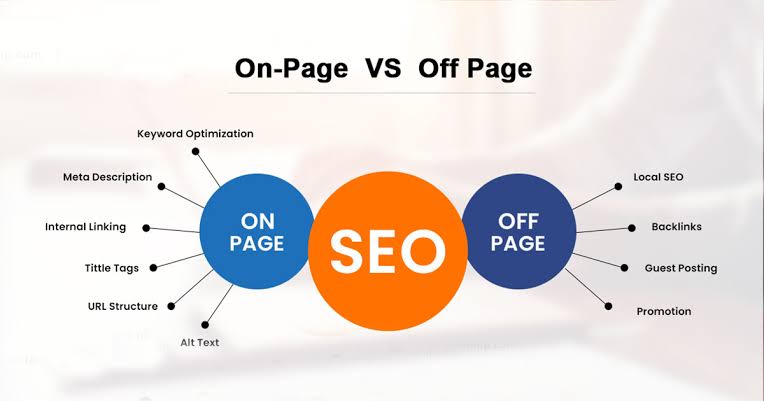Table of Contents
If you want your website to rank high on Google in 2025, you need to understand two essential pillars of search engine optimization (SEO): on-page SEO and off-page SEO. Both are critical for driving or ganic traffic, improving visibility, and boosting your site’s credibility.
But here’s the thing — while they work together to help you dominate search results, they focus on different aspects of your website’s optimization. In this guide, we’ll break down the differences, benefits, and strategies for both on-page and off-page SEO so you can create a powerful SEO strategy that works.

What is On-Page SEO?
On-page SEO refers to all the actions you take directly on your website to optimize individual pages for search engines and users. It focuses on improving your site’s content quality, structure, and HTML source code to make it more attractive to search engines.
Key Elements of On-Page
- High-Quality Content
- Content should be unique, valuable, and relevant to your target audience.
- Example: A blog post that answers a common question with in-depth research and actionable tips.
- Keyword Optimization
- Using primary and secondary keywords naturally within your headings, paragraphs, and meta descriptions.
- Avoid keyword stuffing, which can harm rankings.
- Title Tags and Meta Descriptions
- The title tag appears in search results and should include your main keyword.
- Meta descriptions summarize your page content and encourage clicks.
- Header Tags (H1, H2, H3)
- Organizing your content using headings makes it easier for readers and search engines to understand.
- URL Structure
- Short, descriptive URLs that include your keyword are more SEO-friendly.
- Example:
www.example.com/on-page-seo-guide
- Internal Linking
- Linking to other relevant pages on your site improves navigation and distributes link equity.
- Image Optimization
- Using descriptive alt text, compressing image size, and choosing the right file format.
- Mobile Friendliness
- With mobile-first indexing, your site must look and work perfectly on mobile devices.
- Page Speed
- Fast-loading pages improve user experience and rankings.
What is Off-Page SEO?
Off-page focuses on actions taken outside of your website to improve its authority, trust, and visibility. It’s about building a strong reputation across the internet, which search engines interpret as a sign of credibility.
Key Elements of Off-Page
- Backlinks (Link Building)
- Getting links from high-authority websites is the backbone of off-page SEO.
- Example: Guest posting on reputable blogs or getting mentioned in the news.
- Social Media Marketing
- Sharing your content on platforms like Facebook, LinkedIn, and Twitter to increase visibility.
- Brand Mentions
- Even without links, mentions of your brand across the web can boost authority.
- Influencer Outreach
- Collaborating with influencers in your niche to reach a broader audience.
- Content Marketing
- Publishing valuable content on third-party sites to attract backlinks and traffic.
- Local SEO & Citations
- Listing your business in online directories and ensuring consistent NAP (Name, Address, Phone) information.
- Forums and Community Engagement
- Participating in discussions on platforms like Reddit or Quora.

See also
- Hostinger Review 2025: Is It the Best Budget Hosting?
- Hostinger for WordPress: Full Setup + Performance Guide
- Advanced & Technical SEO: What Is Technical SEO? A Comprehensive 2025 Checklist
- Top 10 Common SEO Mistakes New Website Owners Make
On-Page vs. Off-Page SEO: The Core Differences
| Aspect | On-Page SEO | Off-Page SEO |
|---|---|---|
| Focus | Optimizing elements on your own website | Actions outside your website to improve authority |
| Goal | Improve relevance and user experience | Improve credibility and domain authority |
| Examples | Keywords, meta tags, internal links, speed | Backlinks, social shares, brand mentions |
| Control | Fully under your control | Influenced by external factors |
| Measurement | Page-level metrics (rankings, CTR) | Domain-level metrics (DA, backlink profile) |
Why You Need Both On-Page and Off-Page SEO
Think of SEO like building a house:
- On-page is the solid foundation, strong walls, and well-designed rooms.
- Off-page is the reputation your house has in the neighborhood.
Without a strong on-page structure, even the best backlinks won’t help much. And without off-page signals, your well-optimized site may struggle to compete.
On-Page SEO Best Practices
- Conduct keyword research before writing content.
- Write for humans first, search engines second.
- Use internal links to keep visitors on your site longer.
- Optimize your images and videos.
- Improve site navigation for better UX.
- Regularly update old content.
Off-Page SEO Best Practices
- Focus on building quality backlinks, not just quantity.
- Engage with your audience on social media.
- Network with influencers and industry experts.
- Create shareable, link-worthy content like infographics and research reports.
- Monitor your brand mentions and respond when necessary.
- Join niche-specific communities and contribute value.
Common Mistakes to Avoid
On-Page SEO Mistakes
- Keyword stuffing
- Ignoring meta tags
- Poor site speed
- Broken internal links
Off-Page SEO Mistakes
- Buying low-quality backlinks
- Ignoring local SEO opportunities
- Overlooking social engagement
- Focusing only on quantity over quality
FAQs About On-Page vs. Off-Page
1. Which is more important: on-page or off-SEO?
Both are equally important. On-SEO ensures your site is relevant and user-friendly, while off-page SEO boosts your credibility and authority.
2. How long does it take to see results?
On-page changes can show results within weeks, while off-SEO may take months to build authority.
3. Can I do SEO without backlinks?
You can rank for low-competition keywords without backlinks, but for competitive terms, backlinks are essential.
4. Do social media links help SEO?
Indirectly, yes. They can drive traffic, increase brand awareness, and lead to more backlinks.

Conclusion
Understanding the difference between on-page and off-page is essential for creating a balanced SEO strategy. On-page ensures your website is relevant and user-friendly, while off-page SEO builds its authority and reputation.
For the best results in 2025, focus on both — create high-quality, keyword-optimized content and build relationships that lead to valuable backlinks.
Your action step: Audit your site today, optimize your on-page elements, and start an outreach plan to grow your off-page presence. The sooner you start, the sooner you’ll see your rankings climb.


